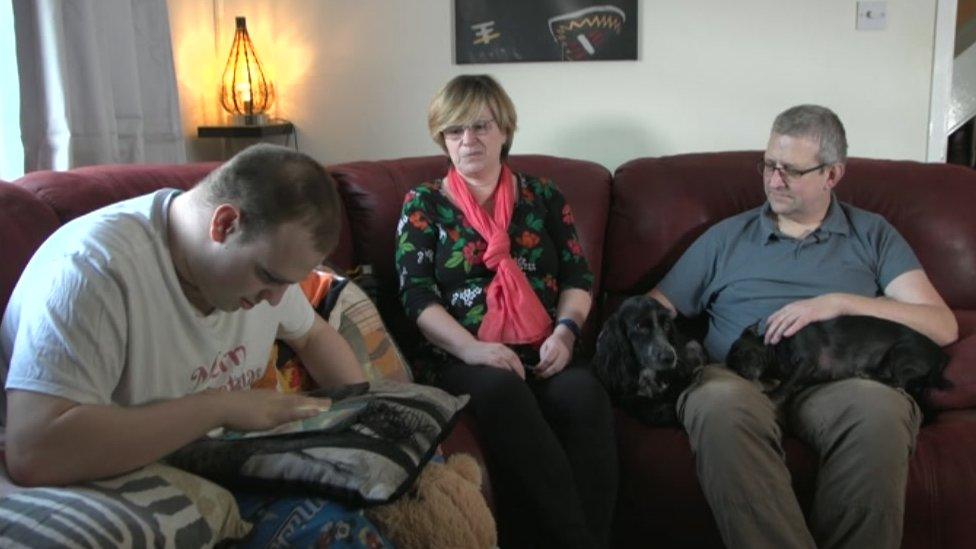Residents 'not safe' in Somerset care homes
- Published

Sarah and David Moore removed their son Marcus from Discovery's care because were concerned about his care
Some families of vulnerable adults with learning disabilities in Somerset say they are concerned their relatives are not always safe in their care homes.
A diabetic man who was rushed to hospital, potentially due to a lack of insulin, and residents being left unsupervised are among issues raised.
Private care provider Discovery began running services in the county in 2017.
The company said it took safety "extremely seriously" and any issues were "robustly investigated".
Discovery, a registered charity, took over the care of more than 900 adults with learning disabilities from Somerset County Council nearly two years ago.
Since then there has been a high staff turnover - many former staff told the BBC they left because they were unhappy with new terms and conditions.
'They didn't know him'
Sarah Moore, whose son Marcus is severely autistic and lives in supported living at Badger Street Farm near Taunton, said she only found out he had been taken to A&E with diabetic ketoacidosis late last year when her husband turned up to bring him home for a weekend.
"It could be that somebody had forgotten to give him his insulin," she said.
Mr Moore was removed from Discovery's care because of parents' concerns.
"We were not happy that it was safe. There was no-one that we knew or trusted," his father David Moore said.
"All the staff were either agency, or people that had just come in. They didn't know him. You need to be able to read the signals," Mrs Moore added.
Watch: 'I don't trust my son's care provider'
Pat Durbin said any trust she had in Discovery had "completely gone" after she discovered her son, Steven Bodycombe, got into a bath he filled himself, unsupervised, at a residential care home in Taunton last November.
"It could have been boiling hot water, it could have been freezing cold water. He's not that steady on his feet, he could have slipped and knocked himself out," she said.
"For him to be able to do that, and them not be aware until after the event... it's very worrying."
She said her son had also "escaped" and was found "wandering around outside", trying to get on a minibus.
"I've got absolutely nothing against the individual staff, they are lovely and very committed," she said.
"But they are inexperienced, most of them are very young, and they just haven't got the knowledge of what these guys need yet."
'Not always easy'
Discovery stressed that it was a not-for-profit registered charity, and a "social enterprise".
A spokesperson said Discovery had apologised to the families concerned and it took "the safety of all those in our care extremely seriously".
"Any issues raised with us are immediately and robustly investigated."
They said services were reviewed when Discovery took over providing them and found "support needed updating".
"We deeply regret families' negative experiences and realise that the impact of the change has not always been easy."
They added that restructuring of the service was completed by the end of 2018, and jobs were offered to 93 people between November and January.
They said the service was temporarily more reliant on agency staff but they were "working hard to redress the balance".
This story will be featured on BBC Inside Out West on Monday 4 March at 19:30 GMT.